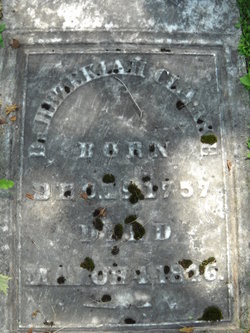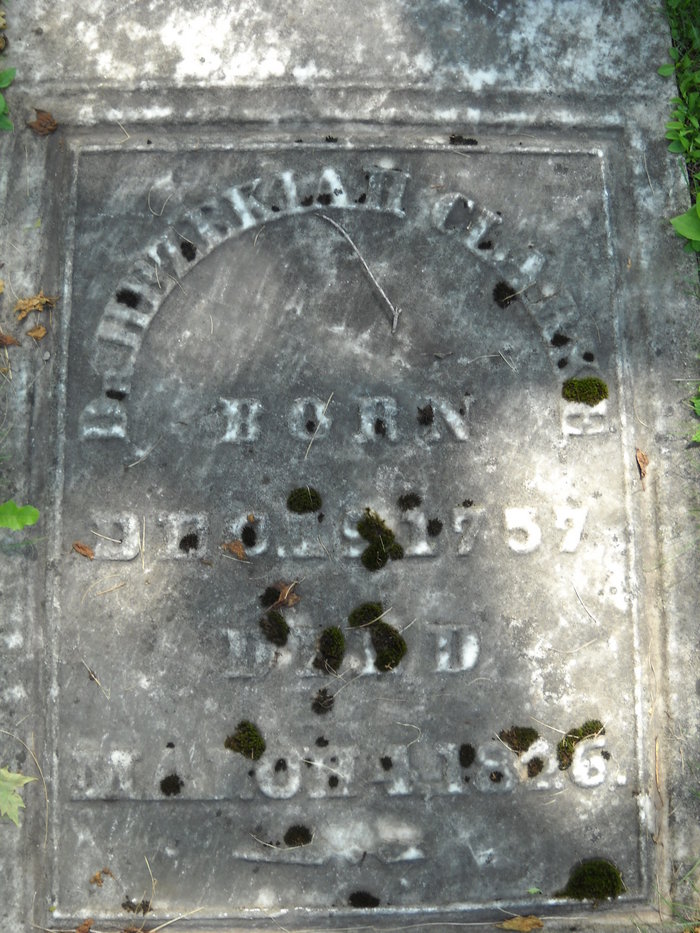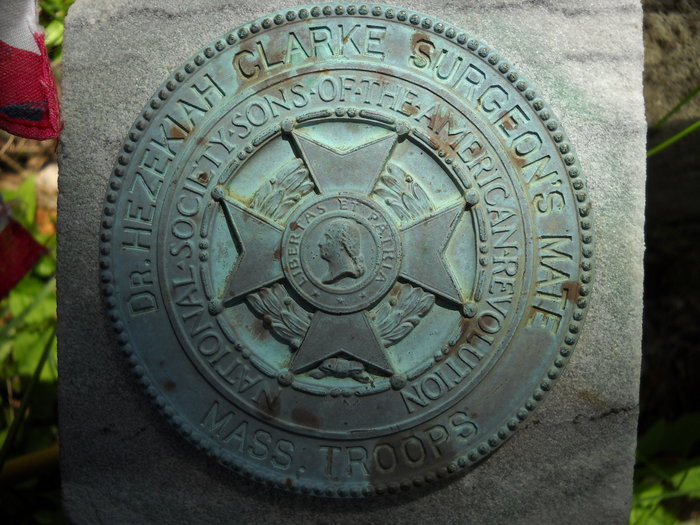His maternal grandmother was Elizabeth Edwards, daughter of Rev. Timothy Edwards, and sister of President Jonathan Edwards.
He qualified himself, under the tuition of his father, in the profession of medicine- and surgery, which he had chosen for the business of life, and received his diploma before he was out of his minority. He received the appointment of Surgeon's Mate at the age of twenty-one years, under Dr. John R. Watrous, Surgeon of the Third Connecticut Regiment, in the army of the Revolution, commanded by Col. Samuel Wyllis, General Parsons' Brigade, subsequently, on the reorganization of the army, denominated the First Connecticut Regiment. The appointment was the more flattering, inasmuch as his warrant was presented to him by Governor Trumbull in person, unexpected by him and unsolicited by any one.
He was stationed with his regiment on the Hudson River, and while there, was detailed with a body of soldiers, on an expedition to Long Island ; but on his return to his regiment, he was obliged to encamp on the wet ground, with only his blanket for a covering, and in the morning found himself enveloped in snow ; the result of which was a violent fever which prostrated him for many weeks, and
brought him to the verge of the grave. When able to be moved, he was conveyed to his father's residence, but did not return to the army, by reason of his protracted illness. He was in active service two years.
When Fort Griswold, situated on Thames River, opposite New London, was attacked by the British, under the command of the arch-traitor Arnold, (Fort Trumbull, situated below the town, having fallen,) the alarm was spread throughout the surrounding country ; and in obedience to the call, he repaired to the scene of devastation, pillage, and murder, to render his professional aid. The enemy having destroyed all the craft on the river, by which aid could pass over to the scene of the massacre, he found, on his arrival, a company of men with stout hearts, who were unable to cross ; but after searching for some time, he found a rickety skift", utterly unseaworthy. Here he found himself in an unpleasant dilemma ; for he could not cross in it alone, and those standing there, refused to accompany him, concluding, in their own mind, that if it could not carry one, though must certainly go down with it. After much effort he prevailed upon one man to row the skiff, while he himself bailed the water out of it ; and thus by their united efforts they arrived safely on the opposite side. He immediately repaired to the scene of woe, and assiduously devoted himself to the unfortunate victims, by dressing their wounds and rendering any other assistance of which they stood in need.
As a testimony of grateful remembrance of the services rendered on that memorable night, and subsequent cheerless days, three of the men whose wounds he dressed called upon him thirty years after to express in person their gratitude for his timely and kindly aid. Dr. Clarke was then a resident of Pompey.
One of the men received a gunshot wound through the knee, another had received a similar wound through the elbow, and the third was wounded in the forehead by a blow from a clubbed musket in the Jiands of an enemy, the cock of which penetrated the brain. All were restored without the dismemberment of a limb.
Soon after the close of the war he settled in Pittsfield, Mass., where he remained about one year. He then married Miss Lucy Bliss, daughter of Hon. Moses Bliss, of Springfield, and grand-daughter of Timothy Edwards, and settled in Lanesborough, Berkshire County, in the same State. There he devoted himself to his profession for about eighteen years, and until he moved with his family to
Pompey, Onondaga County, where he arrived November 3, 1805. He remained on Pompey Hill one year and then settled on a farm two miles southeast from the Hill, and there continued his professional labors.
Few physicians have had as extensive a practice as he. His reputation as a surgeon did not consist so much in the number of limbs amputated as in preserving them. And frequently, when other surgeons had given the patient up as incurable, without amputation has he restored the limb to its wonted soundness. But when it became necessary to resort to the tourniquet and knife, he knew how to use them. He was a skillful operator.
In the winter of 1813-'14, an epidemic, in common parlance, spotted fever, prevailed to an alarming extent. Dr. C. had about three hundred patients, who were prostrated by it, of whom only three died. His treatment of that disease was his own, and not another's. Under other treatment many cases proved fatal. One cause of his success in his professional labors generally was in some measure, attributable to his untiring devotion to those under his care. He spared not himself. One incident, illustrative of that will here be related. During the prevalence of the epidemic, one stormy winter evening such as is sometimes seen on Pompey Hill, Deacon Levi Jerome, the father of Hon.
Amasa Jerome, came in great haste for Dr. C, as three of his family were down with that disease. Mr. Jerome was informed that the Doctor himself was sick, and had been on the bed most of the day, and that he could not go. He stood 1 for he had declined a seat, with tears trickling down his check, and exclaimed, " Must my family lie there and die ?"
He then asked, ' Cannot a bed be put in the sleigh for him, and he be covered up well, and taken to my house.'" (which was five miles away.) " We will take good care of him while there, and he can lie on the bed and tell us what to do." Thus he went, and so he returned. Deacon Jerome lost none of his family by that disease.
On the train of cars, at the formal opening of the Syracuse and Binghamton Railroad to the public, a son of Dr. Clark was providentially seated with Dr. John Miller, of Truxton, N. Y., then quite advanced in life, and who bore a high reputation as a physician, and once represented his district in Congress. In the course of conversation Dr. Miller said that he was a young man when Dr. Clark was on the flood-tide of his profession, and that he frequently called him in counsel in critical cases, and spoke of him in high commendation as a physician and surgeon ; and stated that he witnessed one operation of his, which required a thorough knowledge of the human system, and great skill to perform it successfully. The case was intussasccption, that is the doubling of the intestine into itself, which cannot be reduced to its normal state by internal appliances, but requires the skillful hand of the surgeon. Dr. Miller also said that the operation was most skillfully and successfully performed.
Dr. Clark was a member of the first Board of Trustees of Pompey Academy. His children who lived to adult age, were Henry, Harriet, Charlct, Lucy, John Huntington, William Metcalfe, Moses Bliss, Theodore Edwards.
From History of Onondaga County page 403-404.
His maternal grandmother was Elizabeth Edwards, daughter of Rev. Timothy Edwards, and sister of President Jonathan Edwards.
He qualified himself, under the tuition of his father, in the profession of medicine- and surgery, which he had chosen for the business of life, and received his diploma before he was out of his minority. He received the appointment of Surgeon's Mate at the age of twenty-one years, under Dr. John R. Watrous, Surgeon of the Third Connecticut Regiment, in the army of the Revolution, commanded by Col. Samuel Wyllis, General Parsons' Brigade, subsequently, on the reorganization of the army, denominated the First Connecticut Regiment. The appointment was the more flattering, inasmuch as his warrant was presented to him by Governor Trumbull in person, unexpected by him and unsolicited by any one.
He was stationed with his regiment on the Hudson River, and while there, was detailed with a body of soldiers, on an expedition to Long Island ; but on his return to his regiment, he was obliged to encamp on the wet ground, with only his blanket for a covering, and in the morning found himself enveloped in snow ; the result of which was a violent fever which prostrated him for many weeks, and
brought him to the verge of the grave. When able to be moved, he was conveyed to his father's residence, but did not return to the army, by reason of his protracted illness. He was in active service two years.
When Fort Griswold, situated on Thames River, opposite New London, was attacked by the British, under the command of the arch-traitor Arnold, (Fort Trumbull, situated below the town, having fallen,) the alarm was spread throughout the surrounding country ; and in obedience to the call, he repaired to the scene of devastation, pillage, and murder, to render his professional aid. The enemy having destroyed all the craft on the river, by which aid could pass over to the scene of the massacre, he found, on his arrival, a company of men with stout hearts, who were unable to cross ; but after searching for some time, he found a rickety skift", utterly unseaworthy. Here he found himself in an unpleasant dilemma ; for he could not cross in it alone, and those standing there, refused to accompany him, concluding, in their own mind, that if it could not carry one, though must certainly go down with it. After much effort he prevailed upon one man to row the skiff, while he himself bailed the water out of it ; and thus by their united efforts they arrived safely on the opposite side. He immediately repaired to the scene of woe, and assiduously devoted himself to the unfortunate victims, by dressing their wounds and rendering any other assistance of which they stood in need.
As a testimony of grateful remembrance of the services rendered on that memorable night, and subsequent cheerless days, three of the men whose wounds he dressed called upon him thirty years after to express in person their gratitude for his timely and kindly aid. Dr. Clarke was then a resident of Pompey.
One of the men received a gunshot wound through the knee, another had received a similar wound through the elbow, and the third was wounded in the forehead by a blow from a clubbed musket in the Jiands of an enemy, the cock of which penetrated the brain. All were restored without the dismemberment of a limb.
Soon after the close of the war he settled in Pittsfield, Mass., where he remained about one year. He then married Miss Lucy Bliss, daughter of Hon. Moses Bliss, of Springfield, and grand-daughter of Timothy Edwards, and settled in Lanesborough, Berkshire County, in the same State. There he devoted himself to his profession for about eighteen years, and until he moved with his family to
Pompey, Onondaga County, where he arrived November 3, 1805. He remained on Pompey Hill one year and then settled on a farm two miles southeast from the Hill, and there continued his professional labors.
Few physicians have had as extensive a practice as he. His reputation as a surgeon did not consist so much in the number of limbs amputated as in preserving them. And frequently, when other surgeons had given the patient up as incurable, without amputation has he restored the limb to its wonted soundness. But when it became necessary to resort to the tourniquet and knife, he knew how to use them. He was a skillful operator.
In the winter of 1813-'14, an epidemic, in common parlance, spotted fever, prevailed to an alarming extent. Dr. C. had about three hundred patients, who were prostrated by it, of whom only three died. His treatment of that disease was his own, and not another's. Under other treatment many cases proved fatal. One cause of his success in his professional labors generally was in some measure, attributable to his untiring devotion to those under his care. He spared not himself. One incident, illustrative of that will here be related. During the prevalence of the epidemic, one stormy winter evening such as is sometimes seen on Pompey Hill, Deacon Levi Jerome, the father of Hon.
Amasa Jerome, came in great haste for Dr. C, as three of his family were down with that disease. Mr. Jerome was informed that the Doctor himself was sick, and had been on the bed most of the day, and that he could not go. He stood 1 for he had declined a seat, with tears trickling down his check, and exclaimed, " Must my family lie there and die ?"
He then asked, ' Cannot a bed be put in the sleigh for him, and he be covered up well, and taken to my house.'" (which was five miles away.) " We will take good care of him while there, and he can lie on the bed and tell us what to do." Thus he went, and so he returned. Deacon Jerome lost none of his family by that disease.
On the train of cars, at the formal opening of the Syracuse and Binghamton Railroad to the public, a son of Dr. Clark was providentially seated with Dr. John Miller, of Truxton, N. Y., then quite advanced in life, and who bore a high reputation as a physician, and once represented his district in Congress. In the course of conversation Dr. Miller said that he was a young man when Dr. Clark was on the flood-tide of his profession, and that he frequently called him in counsel in critical cases, and spoke of him in high commendation as a physician and surgeon ; and stated that he witnessed one operation of his, which required a thorough knowledge of the human system, and great skill to perform it successfully. The case was intussasccption, that is the doubling of the intestine into itself, which cannot be reduced to its normal state by internal appliances, but requires the skillful hand of the surgeon. Dr. Miller also said that the operation was most skillfully and successfully performed.
Dr. Clark was a member of the first Board of Trustees of Pompey Academy. His children who lived to adult age, were Henry, Harriet, Charlct, Lucy, John Huntington, William Metcalfe, Moses Bliss, Theodore Edwards.
From History of Onondaga County page 403-404.
Family Members
Advertisement
Advertisement

















